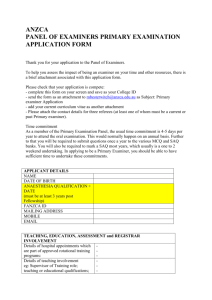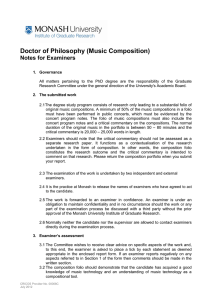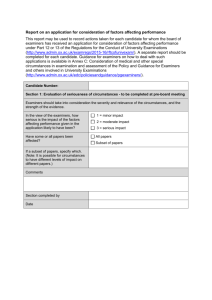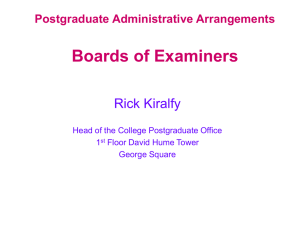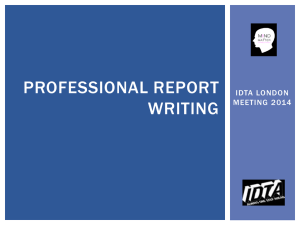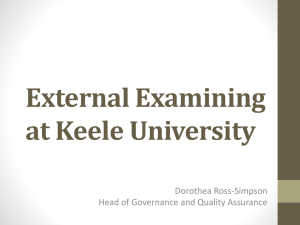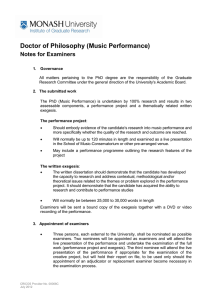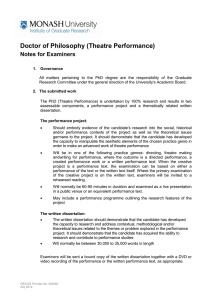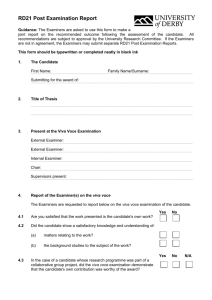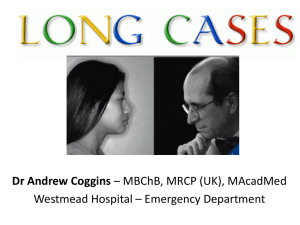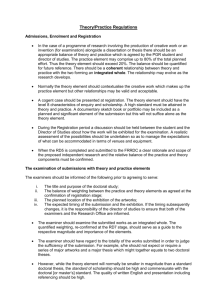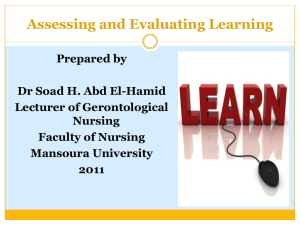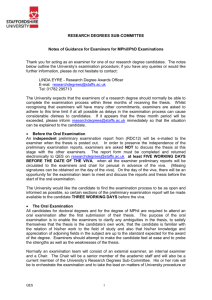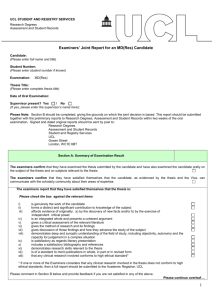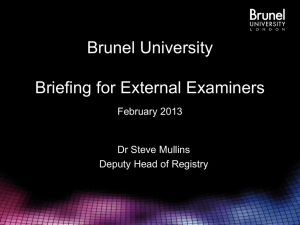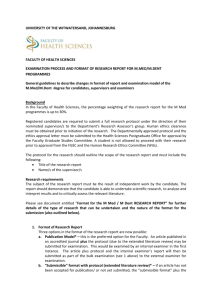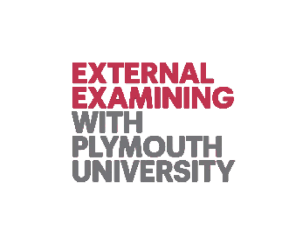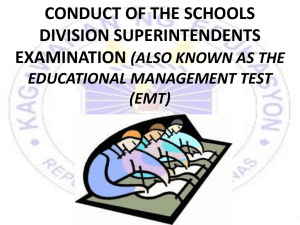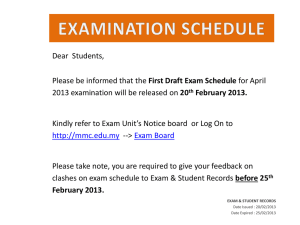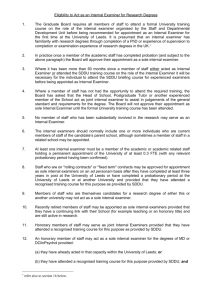Structured Oral Exam - Mymensingh Medical College
advertisement
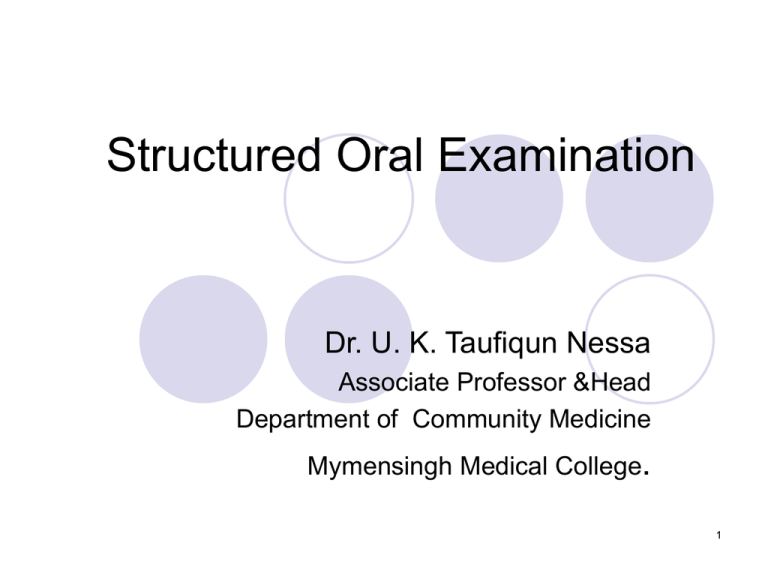
Structured Oral Examination Dr. U. K. Taufiqun Nessa Associate Professor &Head Department of Community Medicine Mymensingh Medical College. 1 Oral Examination An Oral Examination may be defined as an exam consisting of a dialogue with the examiner, who asks questions to which the candidate must reply. Used to probe more deeply a student’s ability to think and to express more of less clearly his knowledge. 2 Oral Examination………. It takes the form of series of interrelated questions. Helps to assess other competencies such as communication skills and professional attitudes 3 Traditional Oral Examination Usually a subjective test; at times, it can be intimidating to the students “It may be formidable even to the best prepared for the greatest fool may ask more than the wisest man can answer”-Charles Colton Often fails to assess properly the cognitive and problem solving skills which is mainly aimed at in oral exam. 4 Traditional Oral Examination In TOE, the atmosphere of the exam is often threatening & at times, the dialogue takes the shape more of confrontation than co-operation 5 What is being measured in the Traditional Oral Exam? In an observational study of a Board Examination, it is found that70 % questions required recall of facts, <20 % ........................ interpretative skills 6 What is being measured in the Traditional Oral Exam?......... 13% ........................... problem solving ability McGuire. So serious doubts exist about the oral exam of current practice regarding its ability to measure the high cognitive skills of a candidate. 7 How reliable and valid-the Traditional Oral Exam? In part these depend on the observed agreements between two or more sets of grades assigned by independent examiners Independent marking by a pair of examiners is rarely done 8 How reliable and valid-the Traditional Oral Exam?... One examiner usually announces the grade and the other either agreed of disagreed producing spuriously high agreement. Comparison between grades of oral exam and marks on written exam and marks on written exam have low correlation coefficients indicating low Reliability or Validity of oral exam. 9 Demerits of Traditional Oral Exam It lacks standardization, objectivity and reliability of results. Possibility of abuse of personal contact There may not be enough adequately trained examiners. 10 Demerits of Traditional Oral Exam……. Expensive in terms of professional time and information yield Language barrier may be a factor for poor performance Test questions and the student responses go unrecorded. 11 How can the oral exam be improved? Possibly, the answer is, by organizing the oral examination in a structured manner By structuring the oral exam, it is possible to elicit from the students their cognitive, Problem solving, interpretative and decision making skills. And ensuring higher degree of validity, reliability and objectivity 12 How can the oral exam be structured? Various elements of oral exam may be organized taking in to accounts the rules The Examiner Careful selection of examiners Paring a new examiner with a more experience person 13 How can the oral exam be structured?.......... Briefing sessions for the examiners Providing the examiners with written instructions regarding the content area to be covered and the nature of competence to be measured. 14 How can the oral exam be structured ?… Atmosphere Creating a non threatening environment. equal duration of time for each candidate Starting with, easy topic, then proceeding to more difficult problems Shifting the topic if someone fails to answer in one area 15 How can the oral exam be structured? … The Questions The questions constructed by a group of faculty with inputs from all those who have participated in the teaching process. A number of questions from each topic covering the content area of varying difficultly among the learning objectives 16 How can the oral exam be structured? … The questions are then framed some to assess recall, but most to assess their problem solving abilities. Most correct answers for each question are decided in advance. Marks allocated for each parts of question, weight age being for different level of difficultly 17 How can the oral exam be structured? ……… Each question is typed on a card and put in boxes of defined domain. A number of questions are made for every topic and collected together Make a large series of cards, each card write one question carefully worded. 18 How can the oral exam be structured? ……… (Check the wording by reading the question to your colleagues and to make sure the they understand the question as-you intended). Divide the cards into groups. Each group is representing one section of the course. 19 The Examination Process The candidate randomly selects on card from each box and answer. The examiner reads the question, repeat if necessary or the candidate reads the question if allowed. No cues or clues are provided. 20 The Examination Process… After the candidate answer the questions the examiners place a tick in an appropriate box on a prepared rating scale. There is a scoring related to the boxes. If failure answer the first question, no further chance in that area. 21 The Examination Process … The examiners should not indicate whether the student answers correctly or not Each examiner should have equal time, each marking individually and scores are averaged. 22 The Examination Process … Each question may be marked individually and summing up at the end. Questions, answers and scores are noted concurrently by the examiners for each candidate-this will help in the feed back session 23 Model questions… Taking an example of Malaria as a problem -The student must know the treatment of malaria at different ages (recall of dosages of anti-malarial drugs). -Must be able to deal with an individual having fever which may be of malaria origin (problem solving). 24 Model questions… The student’s knowledge on these aspects can be assessed by question like: a. Define presumptive treatment in malaria. b. What are the drugs used for presumptive treatment c. Under the National Malaria Eradication Programe, What presumptive treatment is prescribes to a 9 year old child? These questions are basically testing the recall of knowledge. 25 Model questions… It may also be presented as a problem followed by questions e.g. A 10 year old boy is brought to the village health guide with fever of acute onset. • • • What does he do? What type of surveillance is he carrying out? As the medical officer in-charge of the PHC what action will you take? 26 Model questions… This question requires both recall of knowledge and problem solving skills. Each question usually has two to three parts. An attempt is made to increase the level of difficulty in each part. For Example: 27 Model questions… A woman wants to use oral contraceptives for spacing her family. a. How will ensure that she is eligible? You have found that she is eligible for oral contraceptives. a. Explain her the procedure for use. b. What are the side effects of oral contraceptive? 28 Feed Back Session Students feed back is always an important aspect of an assessment. This is very much possible SOE Students are individually appraised about the response to a particular question Question, answers and scores are noted by the examiners for each candidate, so that they can be informed where they scored and where they did not well. Students do come back to find out the lacunae in their knowledge or how to answer certain questions. 29 Validity, Reliability and Objectivity of SOE The outlined scheme makes the oral test more objective and structured, thus imparting higher degree of validity and reliability Objective- because the candidate selects his or her questions, so examiners whim or biases are obviated. Concurrent marking ensures that the examiner does not make an over all assessment 30 Validity, Reliability and Objectivity of SOE . Structured- because the questions are prepared in advancements the educational objectives and clearly define the intellectual level being assessed. 31 CONCLUSIONS Conducted properly, oral examinations are a useful component of assessment. It inculcates in the students, the faculties of thinking fast, clear expression and intellectual honestly It has a special place in medical education because the competence of a doctor is judge by his patients so frequently from the way he talks. 32
